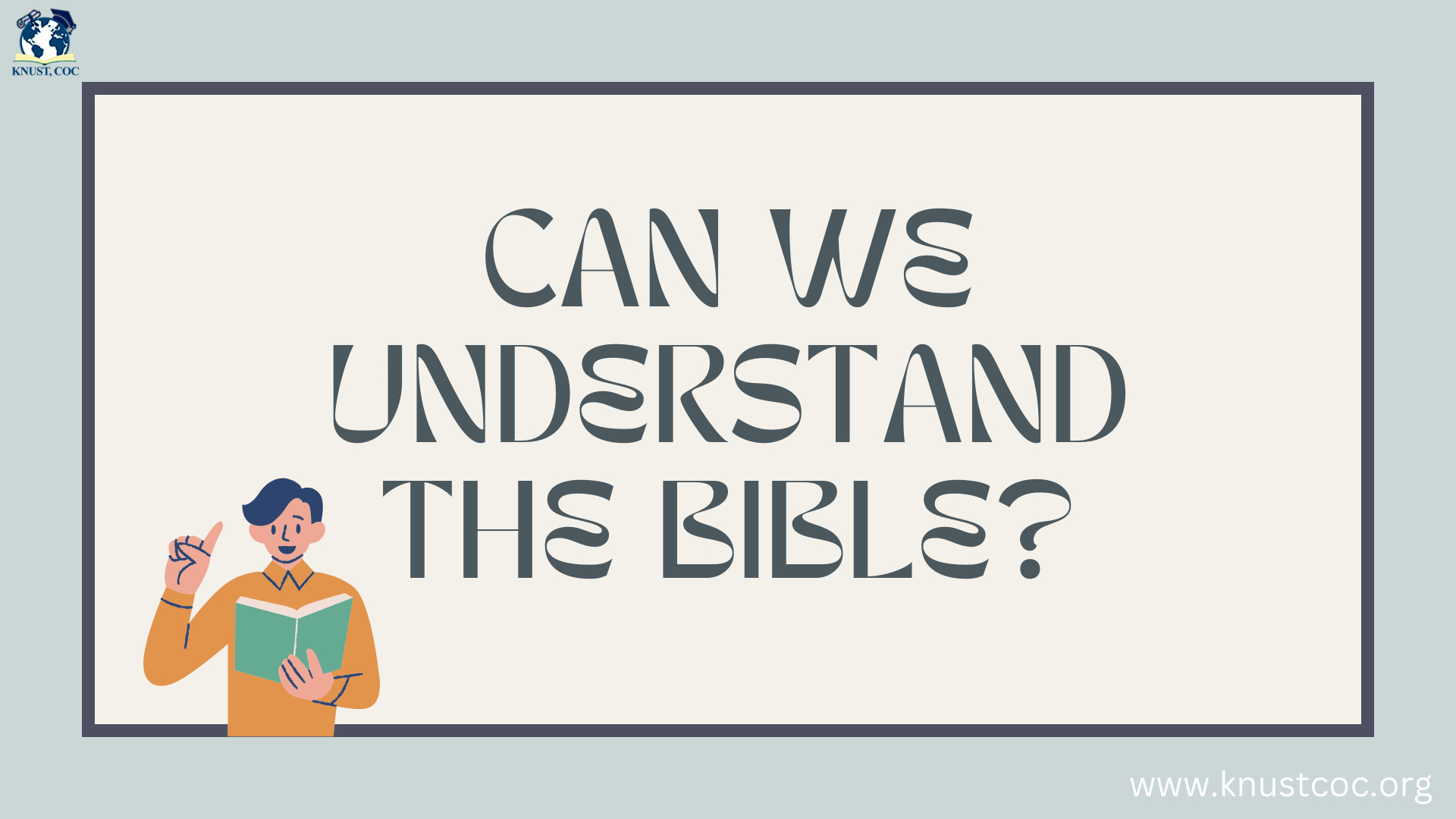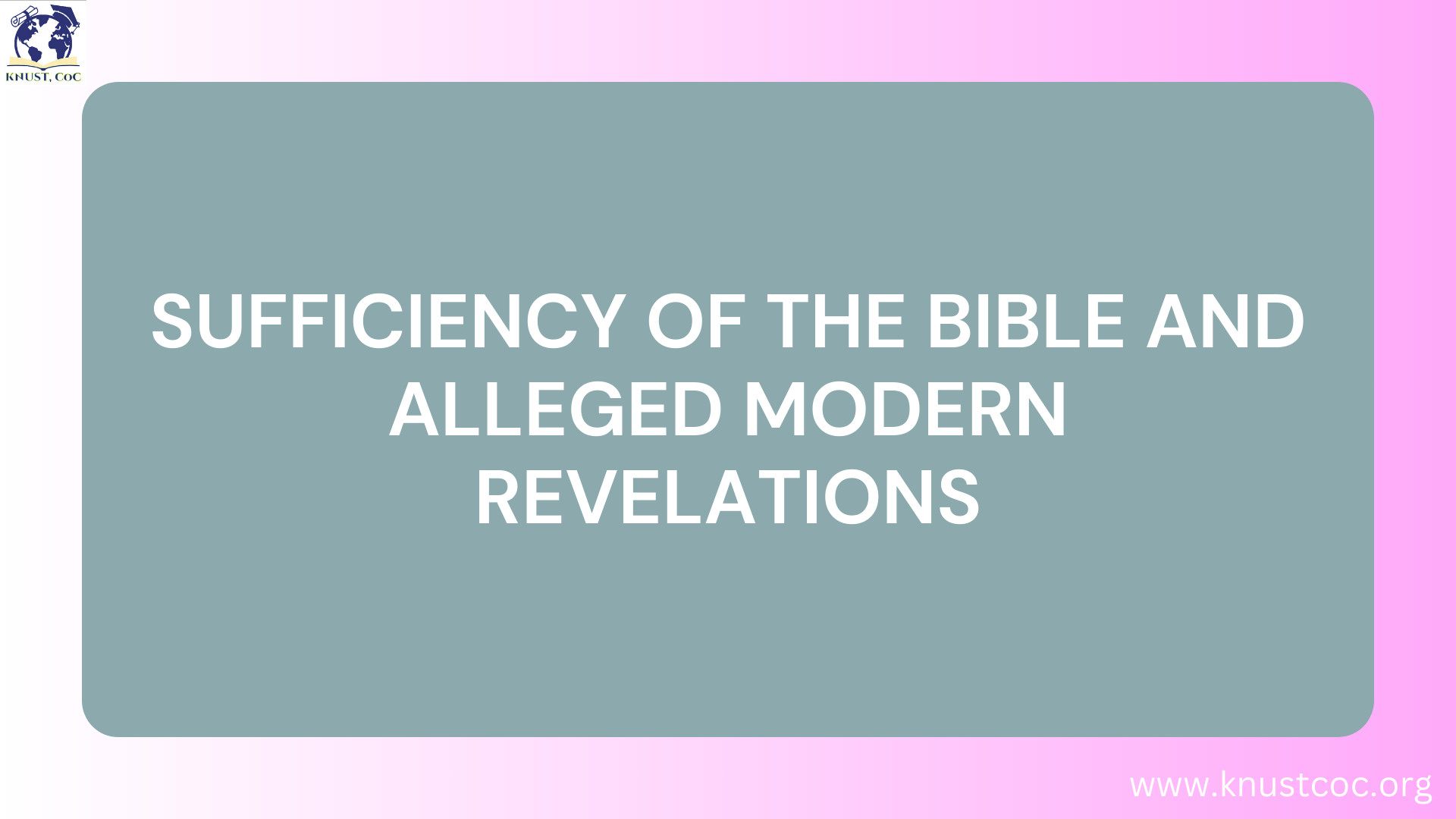
CAN WE UNDERSTAND THE BIBLE?
We Christians are so privileged to have such a loving Father as the almighty God, who in spite of
man’s disobedience from the beginning, loved the world and sent His only begotten son to die
for our salvation (John3:16). God through His inspired holy men has given to us all things that
pertain to life and godliness (2 Pet 1:3) in the scriptures so that we may abide by them and be
perfect for every good work. (2 Tim 3:16)
There is therefore the need to understand what we read from it in order to worship God
according to knowledge, as a lack of knowledge can lead us wayward, no matter our zeal for
God’s work. (Romans 10:1-3, Hosea 4:6).
The need to know whether or not the Bible can be understood
• The Bible would be of no use if it could not be understood.
• Knowing this will either encourage or discourage one from paying attention to Bible
reading and studies.
Can we?
Many, by misunderstanding of passages such as John 14:26, 16:13 think that for one to
understand the Bible, a special kind of interpretation must come from the Holy Spirit, however,
the text contextually talks about Jesus promising His apostles that the Holy Spirit is coming to
reveal to them all truth, i.e the word of God (John 17:17). And to also remind them of all that
He had taught them, and it is evident throughout the scriptures that the Holy Spirit did exactly
that. (2 Tim 3:16, 2 Peter 1:21, 1 Corinthians 4:6)
Claims that people make:
a. Some believe that one cannot just read and understand the Bible except with some
special aid from the Holy Spirit.
b. Others also teach that each individual who reads the Bible will have their own
understandings, which differ from one another. i.e we cannot understand the Bible
alike.
Not only do we read Bible passages that teach the fact that we can read the scripture and
understand it, but we also read specific examples where some characters read the bible and
understood it.
➢ In Ephesians 5:17, Christians are commanded to understand the will of God. We are
expected to approach Bible studies with all diligence in order to understand it and be
able to divide it rightly and not otherwise (2 Tim 2:15, OKJV). Jesus expected the
Pharisees to understand it as they read (Luke 6:3).
➢ We read of a congregation that gave attention to fair-minded studies so as to be able to
verify whatever teachings they heard before they accepted or rejected them. (Acts 17:11).
The Bereans set an example for all believers, demonstrating that the Christian faith is not
blind but informed and grounded in the knowledge of the truth.
➢ As Paul wrote “how that by revelation He made known to me the mystery as I have
briefly written already, by which, when you read, you may understand my knowledge in
the mystery of Christ”. (Eph 3:3-4).
Hence, we surely can read and understand the Bible for it is God’s will that all men come to
the realization of the truth. (1 Tim 2:4)
WE CAN UNDERSTAND IT ALIKE !
To think that we cannot understand the Bible alike, one is indirectly alleging that:
a. One interpretation is as good as another (no one can be wrong).
b. No one would have to make a change.
NB
➢ One interpretation is not as good as another. John 8:32 talks about knowledge of the
truth. “And ye shall know the truth, and the truth shall make you free.” The clear
implications are: there is the truth which can be known, and it must be known for one
to be free. Proving beyond doubt that, the true (intended) meaning of the scriptures can
actually be known.
➢ According to Ephesians 3:3-4, Paul said the brethren might understand his knowledge in
the mystery of Christ when they read his writings, i.e they might understand the
actual/specific information through reading. This implies there is something in the
message that the author wants readers to understand as it is, but not what different
readers think differently about it. In fact some interpretations of the Bible are termed
“twisting“ (2 Peter 3:16)
➢ Paul lamented for Israelites who by ignorance of God’s righteousness sought to establish
their own, and they were said to not have submitted to the righteousness of God. (Rom
10:1-3). How then is it so if God agrees with everyone having their own interpretations
and understandings?
It is therefore not scripturally right for us to have and lean on different interpretations of the
bible.
NB: diligent studies is needed because some passages may be hard to understand however they
are still understandable. 2 Peter 3:16



